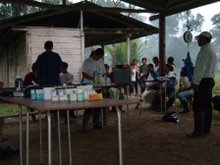California. :)
We're back in California, recovering from jet lag and finishing up some very important conversations with contacts in Juba. The trip was a very fulfilling experience despite the myriad challenges we faced and the many issues that are still unresolved with the clinic. To provide a service like medical care in such a needy community as Malek in a country so overrun by NGO's and international bodies is really tough. South Sudan has been in civil war for so much of the past 60 years, and has depended so heavily on outside aid for sustenance and decision-making, that the government itself is incapable of providing any essential services for its own people. To fit into a model like that is a challenge for any NGO, and even more so for a small, family-operated one like us.
Having said that, some real progress has been made. The building will God willing be complete in 30-45 days, and we have solid staff onsite to supervise and take ownership from the very beginning. The people of Malek and surrounding bomas (aka village areas) are on board. We have blessings from the county and state officials, and are in the process of partnering with the national government and other agencies that work with NGO's to ensure sustainability over time.
One of the most important things I learned in this process was how essential an exit strategy is to a project proposal. Our proposal was 15-20 pages long, depending on the version, and had many details in it. It did not, however, have an exit strategy, as Dr. Baba requested from us in his Juba office two days ago. He explained very patiently that many NGO's, including those working in Jonglei State building clinics, have failed because they want to be completely private, and run out of funding after awhile, or contact the government when they are running out of funding, by which time it is too late for the government to sustain the clinic because they have not provided for it in their budget. By this time, the community has become accustomed to receiving care, and is left with nothing. We have heard this story too many times. According to Dr. Baba, the best way to avoid this is to involve the government early on, which we are in the process of figuring out how to do. We all have one goal: to provide sustainable, high quality, affordable health care services to the people of Malek and surrounding villages.
We are nowhere near the end of this project, a fact that is intimidating but exciting. Even with government participation and ownership, our close involvement, especially in the first year of operation, will be crucial. We have many ideas, including setting up a rotation at the clinic for health care workers from home, expanding the clinic to include more services such as a maternity ward, an operating theater and more beds, and endless other possibilities. It is easy to build a building. It's keeping it going in a sustainable, functional way that's hard. God willing, we will keep learning along the way.
Thanks for reading, and thanks to my amazing mom for being the best part of the trip!
Subscribe to:
Post Comments (Atom)





No comments:
Post a Comment